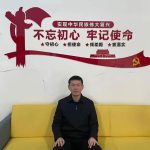By: Trends Editorial Team
 Tan Mingyuan of Neusoft Group is an architect for enterprise digital transformations and designer of ecological digital economy. He has participated in several national research projects of the Ministry of Science and Technology in China, and he is the architect and designer of a number of key smart cities in in his native country.
Tan Mingyuan of Neusoft Group is an architect for enterprise digital transformations and designer of ecological digital economy. He has participated in several national research projects of the Ministry of Science and Technology in China, and he is the architect and designer of a number of key smart cities in in his native country.
Thank you so much for giving Trends this exclusive interview despite your busy schedule, we are very grateful. Please tell us about your organization and your own work related to Smart City initiative(s) in China.
At Neusoft Group I provide consulting and construction implementation services for smart cities. Based on the inspiration of macro urban digital integration innovation, we also design new products and intelligent services for developing enterprises in urban market environment in smart cities. Digitizing of different aspects of life in smart cities will reduce costs, increase efficiency, improve quality of services and reduce depletion of local capacity and resources.
What is the definition of a “Smart City” and what are the key components of it? What are the benefits to various stakeholders (people, government, industry, visitors/tourists…)?
Our understanding of smart city has been gradually upgraded, and with this insight a new definition for a smart city has slowly developed. The basic idea is to use the Internet of Things, cloud computing, big data, artificial intelligence, spatial geographic information, 5G and blockchain and other new generation information technologies to promote a vision of urban planning, construction, operation, and management in these cities and provide universal services for the people. Smart cities provide a new model for industrial transformation, and creates a new way for efficient, orderly, coordinated and safe urban governance.

What are the prerequisites for the implementation/development of smart cities (telecom infrastructure, government policy, private sector adoption) and which of the components are more important than others, if any?
The prerequisite for the development of a smart city is to build a new type of urban infrastructure, unify standards, and achieve intelligent application experience in key areas To do this it is important to unify the goals of the leading organizations. Next is to reach a consensus that digitizing and automating of applications and services will lead to higher productivity Smart city is a systematic project, which needs long-term and comprehensive planning and top-level design to achieve the overall effects of collaborative innovation.
How did China become one of the leaders in the smart city development? When did it all start? Which cities are leaders in the implementation of the smart city concept in China? What are future plans for further development of smart cities? Is China helping other countries/cities with their smart city initiatives?
The Chinese government launched a large-scale pilot project of smart city back in 2012 and promoted the smart city concept to a national strategy in 2014. Once the smart city strategy was approved and begun in China, the pilot project and all aspects of the smart city related foundation and infrastructure activities quickly flourished. There are currently hundreds of smart city pilot areas in China, but those who lead the implementation of the concept of smart city are mainly concentrated in Guangdong, Hong Kong and Macao, and Yangtze River Delta, Beijing Tianjin Hebei, and the Chengdu Chongqing metropolitan areas. Maturity of the concept of smart cities in mainland China and mastery of their construction and development will certainly increase the ability of China for the construction of such cities in friendly countries with China.
How has the Covid-19 pandemic affected the smart city initiatives in China? Is the crisis pushing for faster implementation of smart cities or slowing it down? What are the opportunities and challenges for the roll out of smart cities after the pandemic?
With the expansion of urbanization and the resulting increase in population of cities, the new requirements of urban economy, resource utilization, quality of life, safety and epidemic prevention, as well as the current ecological environment and sustainable development issues, we have witnessed severe challenges faced by urban managers. Smart city development can achieve scientific decision-making, proper urban management, rapid response, and can also enhance the competitiveness of a city. The onset of Covid-19 actually greatly bolstered the expansion of smart cities in China. Smart government, smart security, smart energy, smart environment, smart finance, smart building and smart transportation in our smart cities have led to the development of e-commerce, online entertainment, smart education, telecommuting, smart medical care, smart logistics and other automated areas where services and businesses have benefited. But such sweeping advances also bring their challenges in data security and privacy protection.
What are the key current and future trends and developments with regards to smart cities (globally and in China)?
The process of global urbanization is still advancing with an irresistible trend. According to the prediction of the United Nations, the rate of global urbanization will double in 100 years from 1950 to 2050. For this reason, the best solution to realize the sustainable development of cities will be with advanced new generation of information technology. Through comprehensive long-term planning, and efficiency of multi-industry organizations working together, data fusion, collaborative development, green security, and innovation driven projects are integrated into smart city administrations to optimize functioning of urban areas. Also, for the success of the programs, an independent oversight is necessary to assess the mutual constraints of a number of contradictory and incompatible multi-industry groups so as to materialize the optimization of multi-objective decision-making and achieve a smart society.


